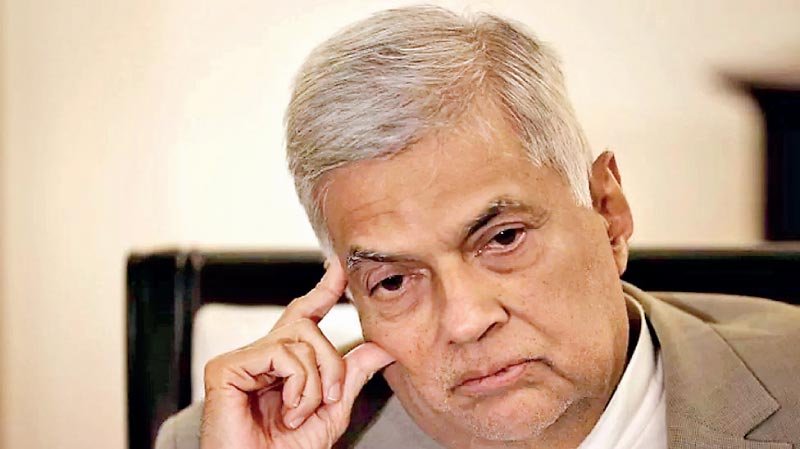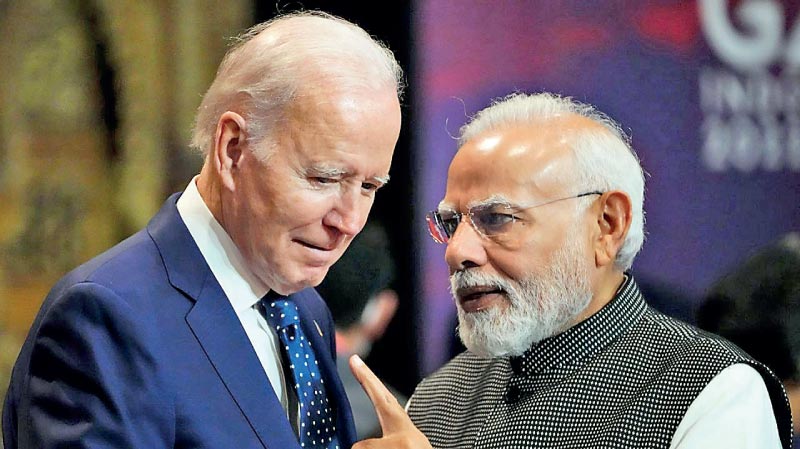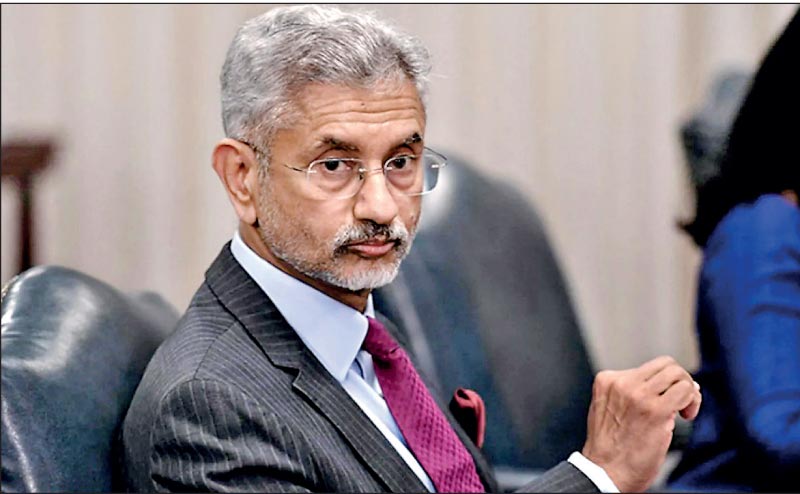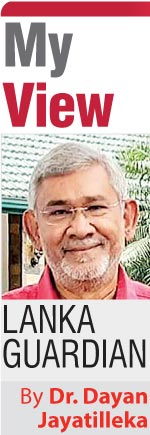Tuesday Feb 17, 2026
Tuesday Feb 17, 2026
Thursday, 20 July 2023 01:47 - - {{hitsCtrl.values.hits}}

President ponders

Modi has a word

Among the best
|
 On President Wickremesinghe’s visit to India, there are things it is prudent for both India and Sri Lanka to undertake and commit to, and things each side should avoid in its own interests and that of the relationship. Ranil should not give away the store in economic terms. He should not integrate Sri Lanka with India economically as is his predilection, in what can only be a risky relationship of subaltern dependency rather than interdependence.
On President Wickremesinghe’s visit to India, there are things it is prudent for both India and Sri Lanka to undertake and commit to, and things each side should avoid in its own interests and that of the relationship. Ranil should not give away the store in economic terms. He should not integrate Sri Lanka with India economically as is his predilection, in what can only be a risky relationship of subaltern dependency rather than interdependence.
This can only jeopardise Sri Lanka’s long-term interests, and as the reality dawns in the shorter-term, prove destabilising to his administration while strengthening ultranationalism and the possibility of political outcomes in which it preponderates or is decisive, i.e., a re-run of 1956.
Delhi deals
India shouldn’t gobble the economic bait that Ranil and Milinda Moragoda will dangle. It is intended to make India a stakeholder in Ranil’s incumbency with or without elections, i.e., draw India into a quagmire. It is Ranil and Milinda’s application of the Myanmar model.
Why has a card-carrying member of the International Democratic Union, the US-UK led global Right, adopt the admirably ambidextrous international policy that President Wickremesinghe lately exhibits? He has studied the Myanmar model: if you get India, China and Russia on board, you can get India to ward-off the West and establish a dictatorship with no fear of external ouster. Ranil seems unaware that the powerful Myanmar military is overstretched and taking hard hits.
The most prudent, productive, and sustainable thing for both India and President Wickremesinghe to do on his visit would be to commit to a compressed timeline for the establishment of a functioning Provincial Council in the Northern and Eastern Provinces, which axiomatically reactivates the 13th amendment.
This would enable India to finally and successfully complete the abortive mission of the great diplomat G. Parthasarathy 40 years ago, in the aftermath of Black July 1983.
Ranil should not trade a Truth & Reconciliation Commission (TRC) for Provincial Council elections. The original TRC was a marvellous blessing in South Africa, a country that had been ruled by a vicious minority and had transitioned to majority rule. The context of the Sri Lankan conflict was structurally different, indeed the exact opposite. Here, wartime accountability would be better served by the recommendations of the late Sir Desmond de Silva QC, in the Paranagama Report.
Even so, an unelected President who earned a reputation as an appeaser of Prabhakaran and the LTTE, doing ‘accountability’ during an economic austerity program and in the year before a presidential election could yield a 1956, which, if an election is blocked, could be ‘1956 with a T-56’.
The stumbling block for the election-phobic Ranil, is that this axiomatically entails the holding of PC elections island-wide as in 1988.
Wickremesinghe will surely attempt the old Basil Rajapaksa scam which Basil learned from JR Jayewardene’s short-lived success in 1985. That is, to trade-in economic incentives for political reform. That was JRJ’s ploy with Romesh Bhandari (which Delhi saw through and aborted), and Basil’s move with a serving Indian High Commissioner (who shall remain unnamed) nearing the end of his term in Sri Lanka.
India should instead go Dharmasokan: adopt the policy of its (actually the subcontinent’s) greatest mind, Gautama the Buddha, and tread a Middle Path. If it commits Ranil to an early date for Provincial Council elections island-wide, it will have a functioning Northern and Eastern PC which can facilitate its economic interests too, though on a less spectacular scale.
Securing Provincial Council elections will not generate a Southern backlash on any serious scale, because Sinhala political society and public opinion will be thankful for any electoral re-opening. The former Gota Gang may be agitated but the SJB, JVP, FPC, SLFP, and FSP will not. It will also serve India’s interests better to stabilise the Sri Lankan system and situation through re-legitimation by an electoral process.
The very heavy going on devolution in the 1980s was because the Sri Lankan system had been de-stabilised and de-legitimised by President Jayewardene removing Madam Bandaranaike’s civic rights and suspending parliamentary elections for six years through a fraudulent Referendum. July 1983 become the massive conflagration it did because it fed on socioeconomic and political resentments thwarted by the absence of a parliamentary election.
Today in 2023, an unelected President and suspended elections make the whole place inflammable and any economic assets acquired, highly toxic. If India opts for a greedier economic option, it will become a permanent target of majoritarian opprobrium, doubtless encouraged by geopolitical rivals through political proxies. By contrast, if Provincial Council elections open-up the safety-valves it would not only be to India’s credit, but it would also re-stabilise the neighbour systemically.
As for President Wickremesinghe, he should feel safer engaging in electoral decompression as JR Jayewardene did in 1988 in a year-long runup to the presidential election. Decompression makes for a smaller target profile than that of unelected ruler who made the island’s North-East an Indian economic enclave.
13th Amendment
The island’s mood is one of depression, reflecting the debt crisis, induced constriction/recession, unprecedented cutbacks, and the collapse of sectors such as health. The NPP-JVP perspective of a post-Independence crisis dating back 75 years is as intelligent as tracing the 1991 collapse of the USSR back to 1917.
Our post-2019 despair is because we’ve never been here before, not even in wartime. The nation’s depression is due to the Fall. The Fall began with Ranil’s ISB splurge in 2015-2019 and accelerated with the economic insanity of the Gotabaya administration.
Whatever we got wrong and from whenever, we got something right which enabled us to win the war which the liberals and the West though unwinnable. When and where we got it wrong was post-war. We didn’t use our second chance to rectify the mistakes that took us to war, while preserving what we got right which took us through the war to victory.
There were contending views. One was that the Sinhala-Buddhists should pre-empt any future problems by entrenching their domination militarily, culturally and in every dimension. The Gota crew’s Netanyahu model – ‘Occupation’ and a garrison state--entailed burying the 13th amendment.
The contrary view, which I fought for, was that we should continue our winning strategy of trading-in (non-federal) provincial autonomy for accountability; promptly settle our IOUs with Delhi; renew India’s role as buffer between us and a West pushed by the embittered Diaspora; and then neutralise or persuade the West. 6 weeks after our diplomatic victory of May 2009 (29 votes for SL, which the West has yet to get against us), I was fired from Geneva for pushing this perspective which had earned us the time and space to win the war. The Kerry-Lugar Report of late 2009 downplayed accountability and proved that all we really had to do was to implement the 13th amendment. If we had done so when we were at our strongest and most successful in 2009, we wouldn’t be in the abyss today; we’d have been Rwanda, at the least. Now, we are at our weakest.
|
Voluntary Economic Enslavement
In his classic ‘The Arthashstra’ Indian sage Chanakya (a.k.a. Kautilya), advisor to Chandragupta Maurya, stated as an axiom that the principal threat to any nation comes potentially from its closest neighbour. No country with a leadership which cares about its strategic autonomy and sovereignty ties it up with a neighbour several times larger and more powerful than itself, but that’s never been a recognisable description of Ranil Wickremesinghe’s leadership.
‘Power and Energy Minister Kanchana Wijesekera announced yesterday that discussions were held regarding a proposal by the Indian Oil Corporation (IOC) for an oil distribution pipeline that would connect Nagapattinam, Trincomalee and Colombo.
“In the meeting, I requested the IOC to consider a two-way oil and gas pipeline that aligns with the Government’s development plan for the Trinco tank farm and energy hub…” he Tweeted yesterday.’ (IOC proposes oil distribution pipeline connecting India-SL | Daily FT)
Note that electricity grids are also supposed to be handled by an Indian company and would hook Sri Lanka up with the Indian (specifically the South Indian) grid.
This is at a time when powerful political voices in Tamil Nadu connected to the ruling party have expressed concern about Hindu-Buddhist dynamics in Northern Sri Lanka.
Recall also the forthcoming privatisation of the SLT and the security implications of a golden share if not complete ownership being given to an expatriate who was once blacklisted by the Sri Lankan state on the grounds of credible LTTE connections.
Considered cumulatively, a fundamental geo-economic and geo-strategic shift could result, to this island’s detriment.
Socioeconomic discrimination
When Premachandra Athukorala, Nishan de Mel and Howard Nicholas, top minds representing three competing schools of economics --liberal, social democrat and Marxist-- voice sharp criticism in the same week about the Government’s economic strategy or important aspects of it, any rational administration would sit up and take notice. Not this one.
No economists were more beloved by Colombo’s economic liberals or free marketeers than WA Wijewardena and Premachandra Athukorala, in ascending order. Now, WA Wijewardena has dissented on the wisdom of the EPF-ETF cuts, and Emeritus Prof Athukorala has performed laser-surgery on the topic, slicing away the fallacies and skewering the shocking truth. Key takeaways follow:
 “…Apparently, the designing of the DDO was preceded by a meeting of the international bondholders and Sri Lankan Government officials together with their financial advisors held in Washington DC in the second week of April 2023 (Reuters 2023b).
“…Apparently, the designing of the DDO was preceded by a meeting of the international bondholders and Sri Lankan Government officials together with their financial advisors held in Washington DC in the second week of April 2023 (Reuters 2023b).
 “…The 30% haircut and interest rate adjustment offered to the international bond holders would amount to about 35% debt relief on ISBs. This deal, which presumably reflects the Government’s desire to quicken progress in debt restructuring, is heavily in favour of the ISB holders compared to what was initially presented in the EFF program.
“…The 30% haircut and interest rate adjustment offered to the international bond holders would amount to about 35% debt relief on ISBs. This deal, which presumably reflects the Government’s desire to quicken progress in debt restructuring, is heavily in favour of the ISB holders compared to what was initially presented in the EFF program.
 In the EFF program, 14.1 billion of the projected external financing gap ($ 25 billion) of the program financing was expected to come from debt reliefs from bilateral creditors and ISB holders. Total external debts subject to restructuring (that is, total debt net of debt to multilateral creditors) was $ 28 billion. The expected debt relief from ISB holders was, therefore, around 50% (assuming equal burden sharing by the two groups of creditors).
In the EFF program, 14.1 billion of the projected external financing gap ($ 25 billion) of the program financing was expected to come from debt reliefs from bilateral creditors and ISB holders. Total external debts subject to restructuring (that is, total debt net of debt to multilateral creditors) was $ 28 billion. The expected debt relief from ISB holders was, therefore, around 50% (assuming equal burden sharing by the two groups of creditors).
 Interestingly, reflecting the ISB holders’ jubilant response to the new deal, which was obviously much better than they had expected, the market price of Sri Lankan ISBs has risen sharply following the announcement of the DDO on 29 June.”
Interestingly, reflecting the ISB holders’ jubilant response to the new deal, which was obviously much better than they had expected, the market price of Sri Lankan ISBs has risen sharply following the announcement of the DDO on 29 June.”
 “The significant difference between the originally anticipated rate of debt relief on ISBs (50%) and the new deal (35%) implies that the original external financial gap projection in the EFF program needs significant revision. The highly favourable deal offered to the ISB holders could also strengthen the hands of bilateral creditors, in particular China, which accounts for the bulk of Sri Lanka’s debt ($ 7.3 billion out of $ 11.5 billion), in forthcoming debt restructuring negotiations. Why ISB holders should be treated in the same way as bilateral donors will require some explanation as ISB holders’ debts are at much higher interest rates and for much lower durations.”
“The significant difference between the originally anticipated rate of debt relief on ISBs (50%) and the new deal (35%) implies that the original external financial gap projection in the EFF program needs significant revision. The highly favourable deal offered to the ISB holders could also strengthen the hands of bilateral creditors, in particular China, which accounts for the bulk of Sri Lanka’s debt ($ 7.3 billion out of $ 11.5 billion), in forthcoming debt restructuring negotiations. Why ISB holders should be treated in the same way as bilateral donors will require some explanation as ISB holders’ debts are at much higher interest rates and for much lower durations.”
 “…Of course, putting the entire burden of domestic debt restructuring on ‘captive’ institutions—the Central Bank and the EPF managed by the monetary board of the Central Bank—is an easy option for the Government. However, the favoured treatment to commercial banks and domestic government security holders compared to the EPF, coupled with the better-than-expected deal offered to the ISB holders, is clearly an inequitable distribution of the burden of debt restructuring among creditors. The savings of salary owners in the EPF is meant to provide a reasonable post-retirement income. Their current real incomes have already been cut by high inflation and higher taxes; now the DDO cuts their future incomes as well.”
“…Of course, putting the entire burden of domestic debt restructuring on ‘captive’ institutions—the Central Bank and the EPF managed by the monetary board of the Central Bank—is an easy option for the Government. However, the favoured treatment to commercial banks and domestic government security holders compared to the EPF, coupled with the better-than-expected deal offered to the ISB holders, is clearly an inequitable distribution of the burden of debt restructuring among creditors. The savings of salary owners in the EPF is meant to provide a reasonable post-retirement income. Their current real incomes have already been cut by high inflation and higher taxes; now the DDO cuts their future incomes as well.”
 “…The proposed partial DDO is highly inequitable. It passes on most of the burden of adjustment onto the salary owners and ordinary people, while sparing the banking sector and treating international creditors and individual domestic creditors very generously. This is not a recipe for social and political harmony, pre-requisites for recovery and sustainable long-term growth….”
“…The proposed partial DDO is highly inequitable. It passes on most of the burden of adjustment onto the salary owners and ordinary people, while sparing the banking sector and treating international creditors and individual domestic creditors very generously. This is not a recipe for social and political harmony, pre-requisites for recovery and sustainable long-term growth….”
https://www.ft.lk/columns/Some-thoughts-on-debt-restructuring-in-Sri-Lanka/4-750578
Paddy Lands Act
Dr. Shantha Devarajan, formerly of the World Bank, now at Georgetown, and one of Ranil’s key economic advisors, signals in an interview given to our Sunday sister-paper, what to expect:
“The economic measures are (i) restructuring state-owned enterprises…(iv) reforming agricultural policies such as the Paddy Lands Act so that farmers can grow the most lucrative crops…”
The Paddy Lands Act of 1958, fathered by Philip Gunawardena under the Prime Ministership of SWRD Bandaranaike, restricted sharecropping (ande cultivation) by capping the share of the harvest that the tiller required to give the owner as ‘tithe’. It was the most progressive measure of the 1956 administration.
How does the Act impede farmers from “growing the most lucrative crops” and how will its abolition facilitate such growth?
Dr. Devarajan says “agricultural policies such as the Paddy Lands Act”. “Such as…”? What are the other such Acts and agricultural policies he refers to and implies are slated for abolition? The Land Reform Acts of the 1970s?
This is a cover for permitting corporate farming, big agribusiness, which has already wreaked havoc with the environment and the human-elephant equation.
Sabotaging an Opposition Front
The unmistakable impression of an excruciatingly slow Opposition is accentuated by the fact the country is in a pre-election year-- not just any election but the all-important Presidential election. If the Opposition believes that a Presidential election is inescapable next year, then it should be far more active than it is in the run-up, now.
If, however, the Opposition believes that the election is in question, that’s all the more reason why it should be vigorously active to pre-empt any moves by the incumbent to de-fund or otherwise defer Presidential election 2024.
Nothing justifies the moderate Opposition’s sloth, but what might explain it is subversion and sabotage by the SJB’s ‘Shenoy-Hausmann’ economic Right. Sajith speaks of Social Democracy. His economics run close to the Biden-Sullivan neo-Rooseveltian paradigm and explicit critique of neoliberal globalism.
Dr. Harsha de Silva and the Economic Blueprint Band don’t let ‘Social Democracy’ sully their lips. Abjectly following Ranil, they continue to advocate only a ‘social market economy’. That concept comes from the centre-right German Christian Democrat leader Konrad Adenauer, not from iconic German Social Democrat leader Willy Brandt from whom UNP Deputy Minister R. Premadasa (originally of Goonesinghe’s Labour party, modelled on Britain’s), on a visit to West Germany, chose to secure patronage for the establishment of the Sri Lanka Foundation Institute (SLFI) for labour education.
Social Democracy is the philosophy and paradigm this country needs in this crisis. Nationally exemplified by President Premadasa’s development paradigm, its viability is demonstrated by the success of his programs.
It is the only Middle Path between (Ranil’s) ultra-Open Economy and (AKD’s) anti-Open Economy; the most reasonable, realistic, progressive (‘pink’) alternative to the (‘red’) JVP.
It is also the likeliest common denominator for a broad, progressive-centrist Opposition alliance.